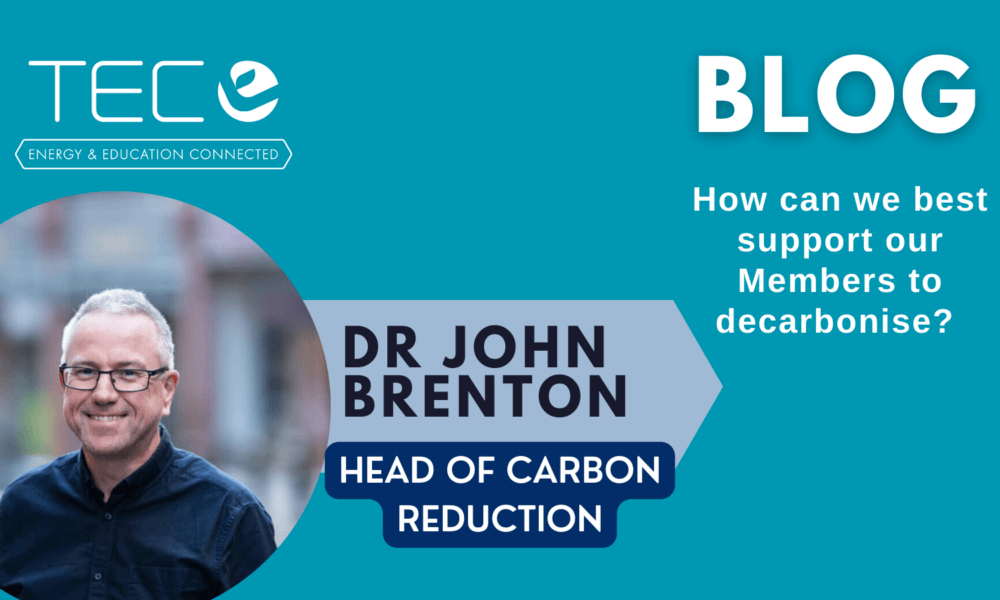News

Blog: Dr John Brenton, Head of Carbon Reduction
New role brings exciting new opportunities for TEC members
Dr John Brenton has recently joined TEC in the newly created role of Head of Carbon Reduction Solutions. With over 20 years’ experience in carbon reduction, including leading on Carbon Management Planning at the University of Bristol, John has a great understanding of the energy challenges and opportunities faced by the education sector.
To date TEC has been very successful at supporting the education sector to procure and manage energy effectively. John is keen to explore how TEC can expand its remit to support its members’ decarbonisation ambitions. We spoke to John to find out more about his aims and aspirations for the sector in the transition to net zero.
What are the major energy challenges the education sector faces?
The sector has a genuine appetite to decarbonise and has worked hard to do so for many years. However, there are tensions between an impetus for growth, carbon ambitions and economic constraints. As with the rest of the UK, the sector faces a major challenge in decarbonising electricity and heat. This means moving away from gas – which has been cheap for many years – and replacing it with lower carbon alternatives which are more expensive.
Overall, up until now, the sector’s focus has been on controlling energy costs and energy consumption. Whilst some universities and colleges have made great strides in carbon reduction, there are many barriers to overcome to make decarbonisation economically feasible.
How can we help the education sector to progress on carbon reduction?
We need more incentives to encourage universities and colleges to reduce their demand and use lower carbon sources. The Public Sector Decarbonisation Scheme has been fantastic in providing grant funding for decarbonising buildings with large sums of money available. However, the scheme has been significantly over-subscribed.
There are other areas which would benefit from greater government funding such as feasibility studies. Whilst there is some funding available in this area, the appetite for it far outweighs what is on offer. Indeed, these studies are key to understanding an institution’s energy profile and to taking a tailored approach to carbon reduction.
Sharing success and good practice is also hugely beneficial and this is an area I hope we can support members with more in the future.
What are the most effective solutions on the market for the sector to decarbonise?
This varies considerably because our members face a diversity of circumstances with radically different estates. This ranges from a large teaching university to a small college, museum or library. Some institutions could be high consumers because they have laboratories which use a lot of heat or because they have data centres which use a lot of electricity.
In terms of solutions, some members have had immense success with putting building energy management systems in place, whilst others have benefitted from solar energy. Reducing energy demand is also key, although in post pandemic world it is not yet clear how much we’ll all be in the office in the future. In summary, smart controls, improving the efficiency of the equipment we use, access to clean energy at the right price, building new buildings to high standards and optimising the space organisations use, will all be key carbon reduction strategies going forwards.
Would you like to see TEC deliver carbon reduction services and support to its members in the future?
TEC has been very successful in helping members to procure energy in a carefully risk-managed way. We have 144 members, representing 72% of higher education establishments as well as several museums and galleries across England and Wales who procure their energy through TEC. However, there is certainly scope for us to facilitate access to a greater breadth of services, particularly around carbon reduction.
To research this further I want to ask members what support they need to deliver their decarbonisation goals. We are going to survey all our members to create a gap analysis of what is required and look at which areas TEC may be able to help with. Ultimately it is about finding good routes to market for our members.
What are your priorities coming into this newly created role?
Finding out what members want to progress on carbon reduction is my biggest priority. Whilst our Member Services advisors talk to members regularly, I would like to broaden that dialogue. My focus is on the added value TEC could bring beyond our traditional remit of controlling costs and prices.
Sharing ideas and success will also be an important outcome of this process. This will also build upon what members already experience through our regional workshops and annual conference. For example, we might discover that location dictates certain problems which require specific solutions. Or we might be able to group together intuitions who are all interested in a particular technology so that they can exchange knowledge and share success.
Is there an appetite amongst the education sector to achieve net zero?
The sector represents a great set of organisations to try new things. Universities are uniquely future focused with strong student and staff voices, which help to draw attention back to sustainability issues. However, there is a balancing act in providing an excellent space to learn, research and teach, but also to ensure that what they are doing is not compromising the future.
Universities work within an economic and legislative framework so there is only a certain amount of choices they can make to support carbon reduction. Some of our members have strong net zero or carbon neutral targets and some have made declarations of climate emergencies. Others may not be so far along their decarbonisation journey. The bottom line is that economic constraints will always make this challenging. At TEC, I hope we can find solutions and facilitate conversations to help members overcome this challenge.



